Posts - Page 132 (page 132)
-
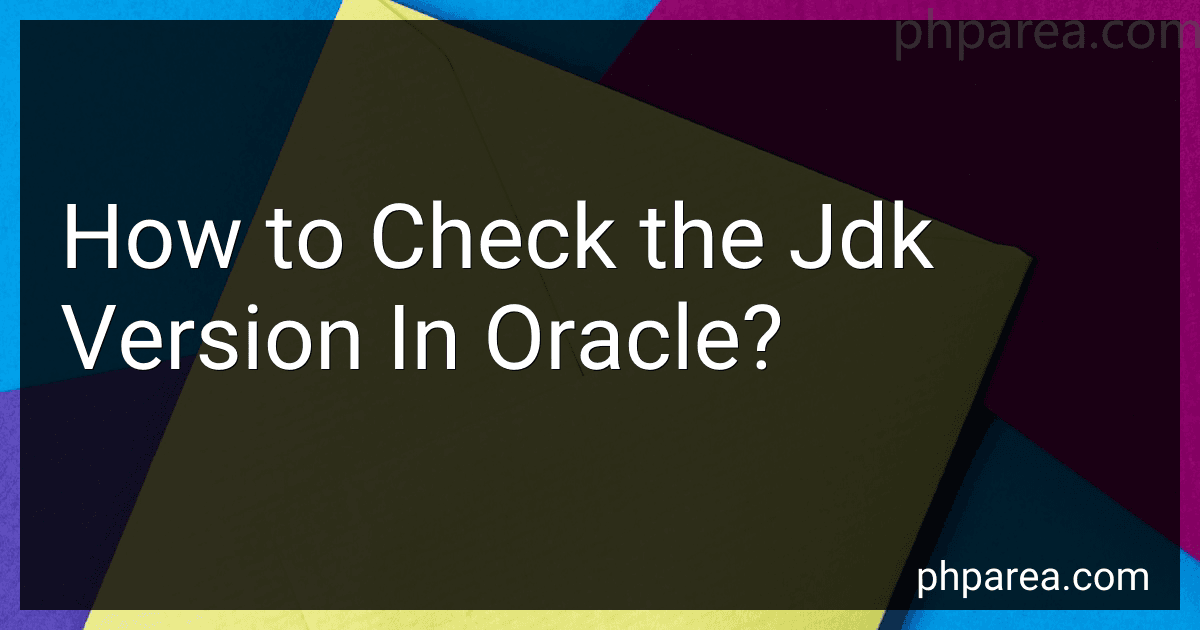 3 min readTo check the JDK (Java Development Kit) version in Oracle, you can follow these steps:Open a command prompt or terminal window.Type "java -version" and press Enter.The Java version installed on your system will be displayed in the output.This command will provide you with information about the installed Java version, including the version number and additional details. It is a quick and convenient method to check the JDK version on your Oracle system.
3 min readTo check the JDK (Java Development Kit) version in Oracle, you can follow these steps:Open a command prompt or terminal window.Type "java -version" and press Enter.The Java version installed on your system will be displayed in the output.This command will provide you with information about the installed Java version, including the version number and additional details. It is a quick and convenient method to check the JDK version on your Oracle system.
-
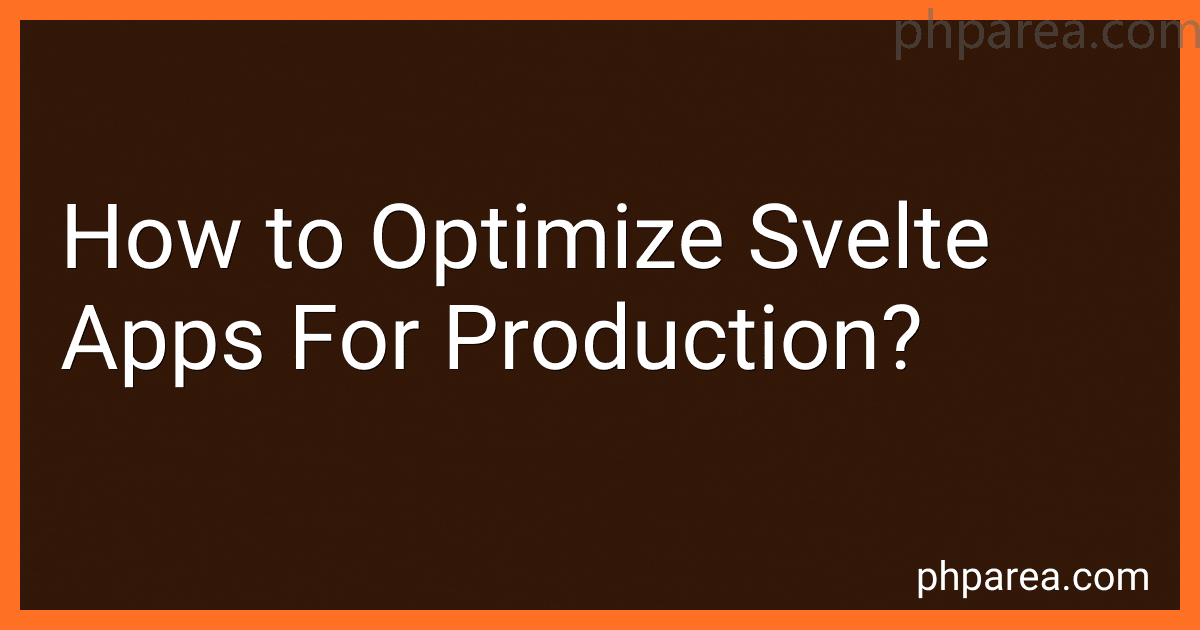 8 min readTo optimize Svelte apps for production, you need to focus on reducing bundle size, improving runtime performance, and enhancing user experience. Here are some key considerations:Code splitting: Divide your code into smaller chunks or modules to enable lazy-loading and improve initial load times. Avoid bundling all components into a single file, as it can increase the bundle size and delay rendering.
8 min readTo optimize Svelte apps for production, you need to focus on reducing bundle size, improving runtime performance, and enhancing user experience. Here are some key considerations:Code splitting: Divide your code into smaller chunks or modules to enable lazy-loading and improve initial load times. Avoid bundling all components into a single file, as it can increase the bundle size and delay rendering.
-
 8 min readTo get the value between two strings in Oracle SQL, you can use the built-in function SUBSTR and INSTR.
8 min readTo get the value between two strings in Oracle SQL, you can use the built-in function SUBSTR and INSTR.
-
 6 min readTo implement animations with SvelteMotion, you can follow these steps:Import the necessary functions from the svelte-motion library. For example, you might import motion from svelte-motion to enable animations. Wrap the component or element that you want to animate with the motion component. This component will enhance the element with animation properties and enable you to apply animation effects. Use the available animation properties provided by motion to animate your component.
6 min readTo implement animations with SvelteMotion, you can follow these steps:Import the necessary functions from the svelte-motion library. For example, you might import motion from svelte-motion to enable animations. Wrap the component or element that you want to animate with the motion component. This component will enhance the element with animation properties and enable you to apply animation effects. Use the available animation properties provided by motion to animate your component.
-
 6 min readTo assign a foreign key in Oracle 10g, you need to follow the syntax: ALTER TABLE child_table ADD CONSTRAINT fk_constraint_name FOREIGN KEY (child_column) REFERENCES parent_table (parent_column); Here, child_table is the table that will contain the foreign key, while parent_table is the table that contains the primary key that the foreign key references.
6 min readTo assign a foreign key in Oracle 10g, you need to follow the syntax: ALTER TABLE child_table ADD CONSTRAINT fk_constraint_name FOREIGN KEY (child_column) REFERENCES parent_table (parent_column); Here, child_table is the table that will contain the foreign key, while parent_table is the table that contains the primary key that the foreign key references.
-
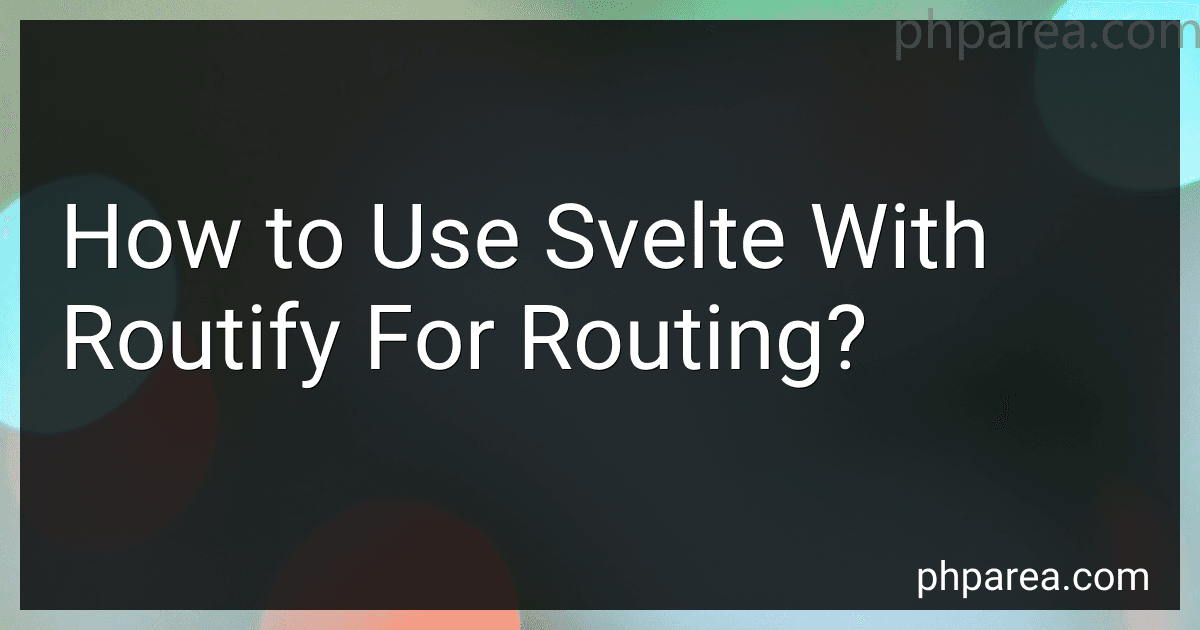 6 min readSure! Svelte is a JavaScript framework that allows you to build user interfaces. Routify is another tool that helps in creating routes for your application. When using Svelte with Routify, you can effectively handle routing within your Svelte application.To begin using Svelte with Routify, you need to follow a few steps:Install Routify: Start by installing Routify globally or within your project using npm or yarn.
6 min readSure! Svelte is a JavaScript framework that allows you to build user interfaces. Routify is another tool that helps in creating routes for your application. When using Svelte with Routify, you can effectively handle routing within your Svelte application.To begin using Svelte with Routify, you need to follow a few steps:Install Routify: Start by installing Routify globally or within your project using npm or yarn.
-
 6 min readCreating a "partially materialized" view in Oracle involves using the Materialized View feature along with a query rewrite technique. This allows you to have both materialized and non-materialized data within the same view, based on specific conditions.Here's a step-by-step explanation of how to achieve this:Start by creating a Materialized View that contains all the necessary data, whether it is fully materialized or not. This is called the "base" Materialized View.
6 min readCreating a "partially materialized" view in Oracle involves using the Materialized View feature along with a query rewrite technique. This allows you to have both materialized and non-materialized data within the same view, based on specific conditions.Here's a step-by-step explanation of how to achieve this:Start by creating a Materialized View that contains all the necessary data, whether it is fully materialized or not. This is called the "base" Materialized View.
-
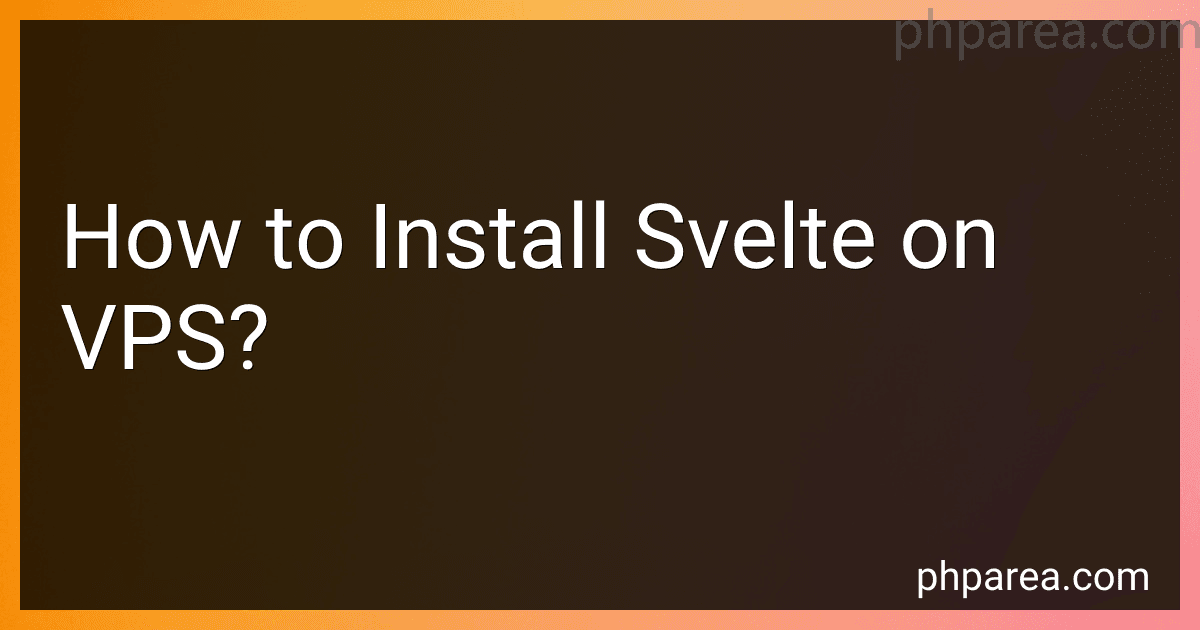 10 min readTo install Svelte on a VPS (Virtual Private Server), you can follow these steps:Connect to your VPS: Use SSH (Secure Shell) to log in to your VPS. Open a terminal and type the command: ssh username@vps_ip_address. Replace "username" with your VPS username and "vps_ip_address" with the IP address of your VPS. Enter your password when prompted.
10 min readTo install Svelte on a VPS (Virtual Private Server), you can follow these steps:Connect to your VPS: Use SSH (Secure Shell) to log in to your VPS. Open a terminal and type the command: ssh username@vps_ip_address. Replace "username" with your VPS username and "vps_ip_address" with the IP address of your VPS. Enter your password when prompted.
-
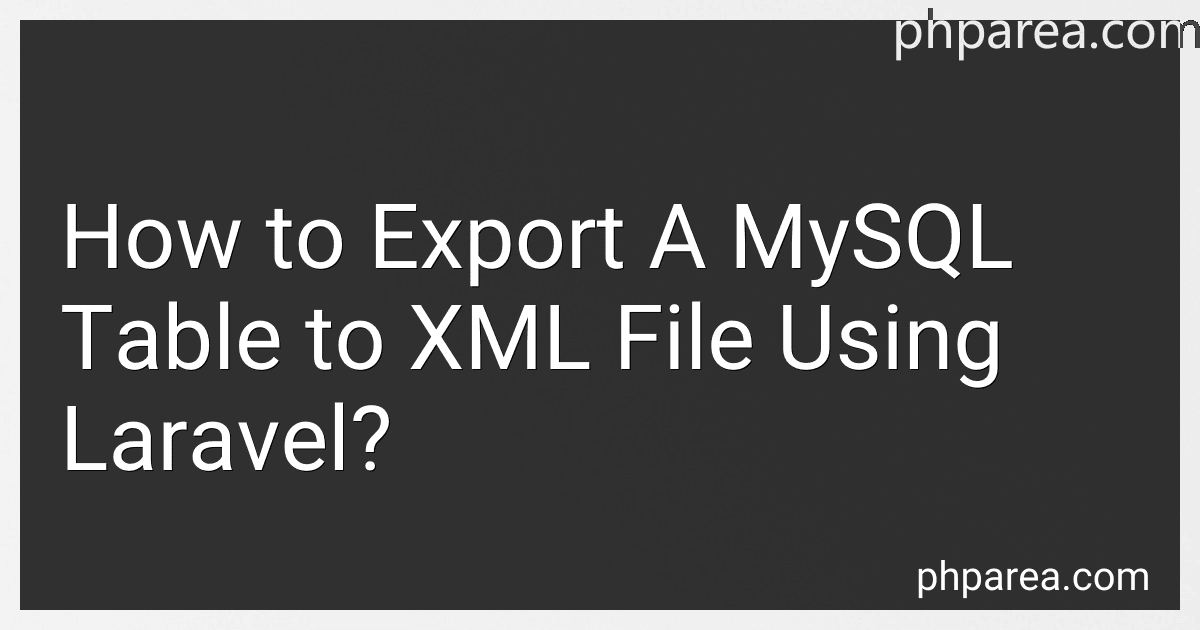 9 min readTo export a MySQL table to an XML file using Laravel, you can follow these steps:First, make sure you have Laravel and MySQL installed and configured on your system. Open your Laravel project in a code editor and locate the file where you want to export the MySQL table to XML. Import the necessary classes.
9 min readTo export a MySQL table to an XML file using Laravel, you can follow these steps:First, make sure you have Laravel and MySQL installed and configured on your system. Open your Laravel project in a code editor and locate the file where you want to export the MySQL table to XML. Import the necessary classes.
-
 7 min readTo install WooCommerce on Cloudways, follow these steps:Log in to your Cloudways account.On the Cloudways console, click on the "Applications" tab.Next, click on "Add Application" and choose the PHP version and server of your preference.Enter a name for your application and click on the "Add Application" button.Once the application is created, click on the "Access Details" tab.On the "Access Details" page, note down the FTP/SFTP access details.
7 min readTo install WooCommerce on Cloudways, follow these steps:Log in to your Cloudways account.On the Cloudways console, click on the "Applications" tab.Next, click on "Add Application" and choose the PHP version and server of your preference.Enter a name for your application and click on the "Add Application" button.Once the application is created, click on the "Access Details" tab.On the "Access Details" page, note down the FTP/SFTP access details.
-
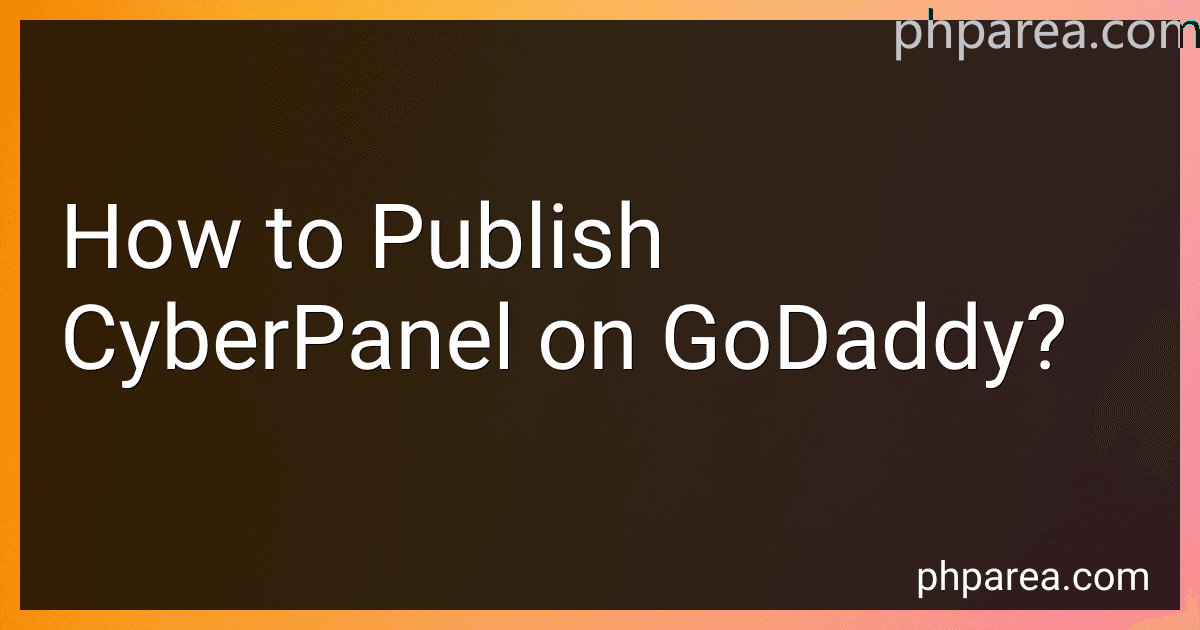 8 min readPublishing CyberPanel on GoDaddy is a relatively straightforward process. Follow these steps to get started:Sign in to your GoDaddy account and navigate to your hosting dashboard. In the hosting dashboard, locate the option to add a new website or domain. Choose the domain or subdomain you want to use for hosting your CyberPanel installation. Once you have selected the domain, you will be taken to the website setup wizard. Look for an option that allows you to specify custom hosting settings.
8 min readPublishing CyberPanel on GoDaddy is a relatively straightforward process. Follow these steps to get started:Sign in to your GoDaddy account and navigate to your hosting dashboard. In the hosting dashboard, locate the option to add a new website or domain. Choose the domain or subdomain you want to use for hosting your CyberPanel installation. Once you have selected the domain, you will be taken to the website setup wizard. Look for an option that allows you to specify custom hosting settings.
-
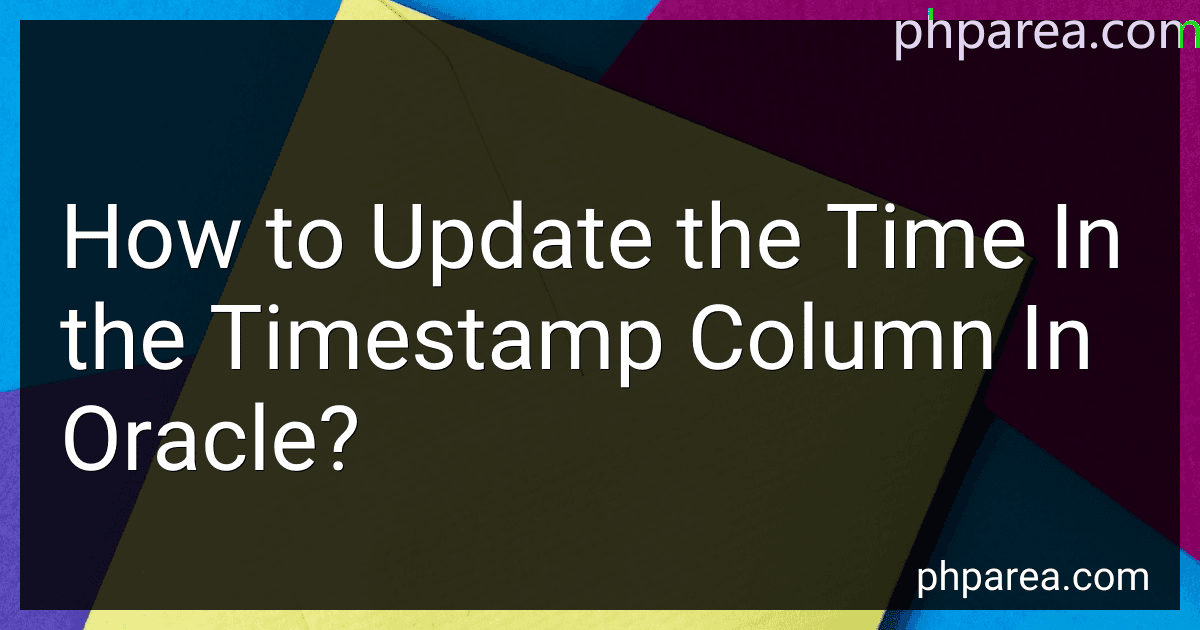 5 min readTo update the time in the timestamp column in Oracle, you can use the Oracle's built-in functions to manipulate the timestamp value. One way to do this is by using the TO_TIMESTAMP function to convert the existing timestamp column value to a specific format, and then using the TO_CHAR function to extract the date portion of the timestamp column. Finally, you can concatenate the new time value to the date portion using the TO_TIMESTAMP function with the required format.
5 min readTo update the time in the timestamp column in Oracle, you can use the Oracle's built-in functions to manipulate the timestamp value. One way to do this is by using the TO_TIMESTAMP function to convert the existing timestamp column value to a specific format, and then using the TO_CHAR function to extract the date portion of the timestamp column. Finally, you can concatenate the new time value to the date portion using the TO_TIMESTAMP function with the required format.